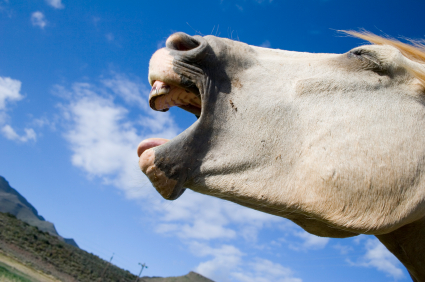 We’ve all been there – dancing around your horse’s mouth, aiming to shoot down some kind of delicious (ie foul) concoction your vet has prescribed, all the while your neighbours are having a giggle at your antics perched on their back verandah. Or perhaps you feel less like a responsible horse owner trying to disguise medication in molasses, and more like a CIA agent attempting to top off the next guy on the hit list. At the end of the day we’ve all had issues trying to get the good stuff down our horse’s throats. We thought we’d share some of our own tips, as we’ve personally had a few ‘spirited’ equine who have resisted oral medication.
We’ve all been there – dancing around your horse’s mouth, aiming to shoot down some kind of delicious (ie foul) concoction your vet has prescribed, all the while your neighbours are having a giggle at your antics perched on their back verandah. Or perhaps you feel less like a responsible horse owner trying to disguise medication in molasses, and more like a CIA agent attempting to top off the next guy on the hit list. At the end of the day we’ve all had issues trying to get the good stuff down our horse’s throats. We thought we’d share some of our own tips, as we’ve personally had a few ‘spirited’ equine who have resisted oral medication.
The first standby for many horse owners is disguising medications in their horse’s normal feeds or molasses. Many have had success with disguising a bitter powder in such, but unfortunately some horse’s aren’t convinced! The main idea with powders, especially bitter ones such as Butalone, is to use something strong enough to disguise the taste, making it something your horse will enjoy.
Our favourite is ....
Red Cordial!
Yes, you read right, red cordial. We usually give it undiluted, mixed with whatever medication the horse requires. We have found that it is strong enough to disguise a bitter taste for most horses, and they seem to love the raspberry flavour (who doesn’t?). We just but a non-name brand 2L bottle, and keep it in the feed shed handy. Another success is jam sandwiches. A combination of the bulk of the sandwich, and the sweetness of the jam, have often been enough to encourage our horses to devour their drugs.
Some drugs need to be given at certain times of the day, although if your one isn’t, it may help to administer just before feed time. Your horse’s natural hunger should hopefully result in speedy swallowing.
The actual method of inserting said drug into equine’s mouth is another issue. Some feed it by placing on top of the feed, although this can increase the risk of your horse missing some and reduce effectiveness of their treatment. Others give it in their hand, though this too can sometimes result in your horse accidentally spitting some out, even if they do like the flavour. Many find a syringe works ok, but still the horse often spits some out.
The best thing we have found to combat these issues is the use of a purpose-made Oral Doser. It is a 50ml Syringe, which uses a long brass nozzle with a slight bend at the end. It is the perfect shape to slide into your horse’s mouth, and reaches right towards the back of the tongue. The brass novel is curved to cause no discomfort. You just slip it in and squirt! We have found using an oral doser, combined with a delicious disguise, such as red cordial, to be the easiest method of medicating. Our horses looked forward to medication time, some whinnying us to hurry up when they saw a flash of the orange doser! The oral doser we stock is inexpensive; we bought our last one 5 years ago and it’s still going strong! After use we just wash it out, pumping water through the nozzle to ensure there’s no build-up.
Drug companies have got on board with this issue and for some time have been giving the option of pleasant-flavoured paste versions of their biggest selling medications. In terms of cost, some medications are on-par with their powder counterparts, and others unfortunately are more expensive. Your vet will discuss your medication options with you, as well as the associated costs. Some clients have found it to be cheaper to use a more expensive paste version of a drug, as they know their horse will take it and this therefore reduces a risk of complications arising from not getting the full dose. If the full course is not taken, you may need to get the vet back to retreat/reassess. For example in the case of an antibiotic, the patient may not get the full course and therefore the infection persists.
It also can’t hurt to ‘practice’ medicating your horse before the time comes. Use whichever method you deem best to dose your horse and get them used to the flavour &/or instrument, minus a bitter aftertaste. This may make the whole process a bit less stressful if they’re not expecting anything nasty!
As you can see, there are many different approaches to medicating your horses, and your course of action really depends on your horse’s own temperament and your vet’s recommendations for the specific condition. You are the one who spends the most time with the horse, and consequently know how they will respond. Just don’t don a black ninja costume in the middle of the night to creep up and surprise them from behind. Double-barrelling may ensue!











Testimonials
"David and his team treat their client’s animals as if they were their own and have helped me and my horses in some very stressful situations over the years, thankfully, always with a excellent outcome!"
"Thank you so much for the extra good care you took of Lilly ... I’ve always been extremely happy with Dave as our vet, I think he truly does a wonderful job, and you can really see how much he cares.”
"The fact that Dave has been my vet for many years speaks volumes. Dave has a very nice manner and deals with the horses in a calm and kind way. He always takes time to explain options and procedures and to advise on what he considers to be the best course of treatment."
"Although we may have moved, we would not consider using any other veterinarian other than David to care for our horses."